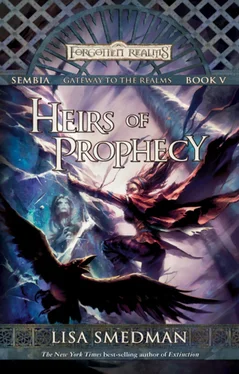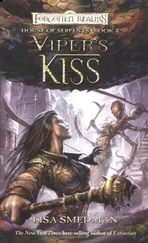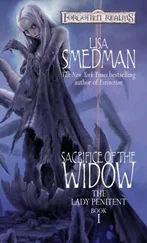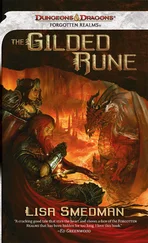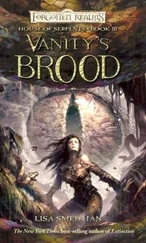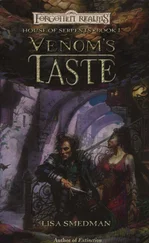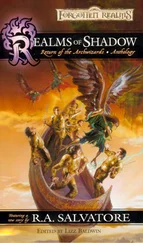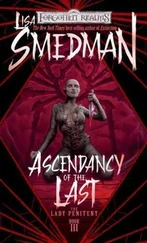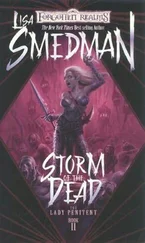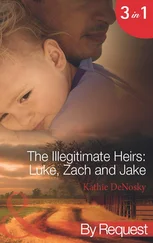Lisa Smedman - Heirs of Prophecy
Здесь есть возможность читать онлайн «Lisa Smedman - Heirs of Prophecy» весь текст электронной книги совершенно бесплатно (целиком полную версию без сокращений). В некоторых случаях можно слушать аудио, скачать через торрент в формате fb2 и присутствует краткое содержание. Жанр: Фэнтези, на английском языке. Описание произведения, (предисловие) а так же отзывы посетителей доступны на портале библиотеки ЛибКат.
- Название:Heirs of Prophecy
- Автор:
- Жанр:
- Год:неизвестен
- ISBN:нет данных
- Рейтинг книги:5 / 5. Голосов: 1
-
Избранное:Добавить в избранное
- Отзывы:
-
Ваша оценка:
- 100
- 1
- 2
- 3
- 4
- 5
Heirs of Prophecy: краткое содержание, описание и аннотация
Предлагаем к чтению аннотацию, описание, краткое содержание или предисловие (зависит от того, что написал сам автор книги «Heirs of Prophecy»). Если вы не нашли необходимую информацию о книге — напишите в комментариях, мы постараемся отыскать её.
Heirs of Prophecy — читать онлайн бесплатно полную книгу (весь текст) целиком
Ниже представлен текст книги, разбитый по страницам. Система сохранения места последней прочитанной страницы, позволяет с удобством читать онлайн бесплатно книгу «Heirs of Prophecy», без необходимости каждый раз заново искать на чём Вы остановились. Поставьте закладку, и сможете в любой момент перейти на страницу, на которой закончили чтение.
Интервал:
Закладка:
Larajin made her way through the streets of Ordulin, navigating by three buildings at the city’s center that rose above all the rest: the Great Hall where the Merchant Council sat, with its gilded dome that shone golden in the late afternoon sun; the crenellated Tower of the Guards that housed the city’s soldiers; and the so-called Guarded Gate-in actuality, an enormous stone-walled and column-fronted warehouse that housed the Sembian mint. Just beyond them lay the Trader’s Quarter, starting point for the caravans that fanned north, east, south, and west through Sembia, carrying the goods of Ordulin’s many merchants.
Though Ordulin was smaller than Selgaunt, its streets were more crowded. Nobles rode past in gilded carriages, with servants holding parasols to shade them from the blaze of the sun. Merchants in elaborately patterned hose and quilted doublets walked the streets, their only concession to the muggy heat being their lace-sleeved shirts, designed to allow the non-existent breezes through. The common laborers had no such pretensions. A gang of stonemasons setting the foundations of a house sweated bare-chested in the heat, while serving women gathering water from a well in the street splashed water onto their reddened faces and bare arms.
High overhead, the tressym wheeled and circled, occasionally disappearing from sight behind a building. So far, no one had noticed her, perhaps thinking her a hawk or an eagle. Larajin hoped it stayed that way.
Throughout the five-day journey to Ordulin, Larajin had remained in the crimson vestments of Sune, but now she wore what she thought of as her “adventuring garb”: serviceable boots, her trouser-skirt, and a lightweight shirt. She still wore the crimson scarf of Sune in her hair, however, and the brass heart hung from her wrist. She might be trying to look nondescript, to blend in, but she would not forsake her devotions to the goddesses-both of them.
As she walked along, Larajin’s ears were filled with the noise of the streets: the clatter of carriage wheels on cobblestones, the calls of merchants from their shops, and the clip-clop of horse’s hooves. She stopped to ask a driver who was lounging on his carriage, waiting for his master, the way to Thread Street, the four-block-long collection of tailor’s shops where Habrith’s friend had his shop. The driver pointed at the next street and indicated she should turn the corner to the right. Thanking him, Larajin walked in that direction.
As she drew closer to the corner, she could hear a commotion. There was laughter and shouting … and the sound of heavy thuds and breaking glass.
Rounding the corner, she saw a knot of people at the side of the road, in front of one of the tailor shops. Its window had been smashed, and a burly man was kicking the front door with a heavy boot. The door crashed open, and the crowd surged inside. A moment later, several heavy bolts of cloth came flying out through the broken window. Laughing, the people outside scooped them up and staggered away down the street, carrying as many as they could under their arms. In front of the shop, two women each grabbed an end of the same bolt of cloth-a green fabric heavily embroidered with the outline of gold leaves-and began squabbling over it like a pair of angry chickens.
Shocked, Larajin realized these people were looting the shop. She looked around, searching for the city watch. She spotted three of them just up the street, lounging on their horses. Not one of the chain-mailed guards made a move for the bow at his pommel, however, or for the mace that hung from his belt. Instead one pointed at the looters, and the other two chuckled.
As she skirted around the mob, crossing to the other side of the road, Larajin noticed a symbol, painted on the door of the looted shop in a blaze of red: a vertical oval, with triangles jutting out of the top of it, like a face with horns. She wondered what it signified. Surely not a symbol of disease, with all of those people so willingly entering the shop. Perhaps the tailor had been convicted of a crime, and this was his punishment?
From inside the shop came the sound of blows and grunts of pain. Larajin hesitated, wondering if she should intervene, then she reminded herself that this was not her quarrel-that she was a stranger in Ordulin with trouble enough of her own. She didn’t need to go shouldering someone else’s burden, especially if the recipient of the mob’s wrath was a criminal. Wincing, she tore herself away. She’d come back to Thread Street later, when the commotion had died down, and seek out the Harper agent.
She strode instead toward the Trader’s Quarter, which lay just ahead. The smell of manure, hay, and axle grease assaulted her nose as she walked through an arched gate into a wide plaza fronted on all four sides by enormous stables. At its center was a notice board; on it was a document bearing the same symbol Larajin had seen on the tailor shop the mob had just looted. Curious, she decided to take a closer look.
She wove through the crowd of people and horses, sidestepping piles of dung that dotted the cobblestones. The notice bearing the horned oval turned out to be an official proclamation-one that sent a chill through Larajin as she read it, despite the heat of the sun on her shoulders. It reminded the citizens of Ordulin that the ten-year-old ban prohibiting elves from entering Sembia was still in effect. Not only that, but the ban now had been extended to half-elves, as well.
Dated less than a tenday ago, the proclamation ordered all half-elves living in Ordulin to leave the city immediately or face retribution at the point of a sword. It further ordered that all homes and businesses belonging to half-elves were to be marked with a sign warning the citizens of Ordulin against doing business with the enemy. An example of the symbol used to designate the property to be confiscated was printed at the bottom of the notice. It was a crude representation of an elf’s face-an oval with pointed, triangular ears.
Sickened, Larajin turned away from the notice board. She realized now that the tailor she’d heard being beaten inside his shop hadn’t committed any crime, other than being born a half-elf. He was probably the man Habrith had told her to contact. Only an agent of the Harpers would tarry so long in a city that was hostile to his race. Was it too late to run back and offer him whatever healing she could-or had the mob that had looted his shop also carried him away … even killed him?
Larajin nervously fingered an ear. Were people looking at her, noticing her too-slim build? If the scales of fate had tipped only slightly differently, giving her the pointed ears of her mother’s race, Larajin could have been the one receiving that beating.
In one corner of the plaza, a dozen men in civilian clothes practiced with pikes, taking turns thrusting at a wooden dummy under the eye of a member of the town guard. They were the militia, no doubt only recently mobilized. Larajin once again was confronted by the oval-and-triangles symbol. This time, it had been painted on the practice dummy.
Ordulin no longer felt like a safe haven. She was in as much danger there as she had been in Selgaunt. She needed to leave the city as soon as possible, to keep moving north. She’d have to try to find the Harper agent in Essembra on her own.
She scanned the notice board, looking for a suitable caravan, but while the notices advertised caravans bound for Yhaunn, for Highmoon, to Archenbridge, and back south to Selgaunt, the only caravans bound for Essembra had departed more than a tenday ago.
“Looking for a caravan, Mistress? Where to? If it’s north, I c’n help you.”
Larajin could smell the man before she turned around. His breath had the fetid odor of a bad tooth, and his appearance matched the smell. His hose had a tear in the knee, and his leather doublet was stained under the arms. One hand rested on the hilt of a sword, which hung in a rust-spotted scabbard at his hip. The man’s scalp was shaved but he wore his beard long. Flecks of what must have been his lunch still clung to it. His eyes kept darting to the money pouch that hung from Larajin’s belt. One cheek puckered as he sucked on his bad tooth.
Читать дальшеИнтервал:
Закладка:
Похожие книги на «Heirs of Prophecy»
Представляем Вашему вниманию похожие книги на «Heirs of Prophecy» списком для выбора. Мы отобрали схожую по названию и смыслу литературу в надежде предоставить читателям больше вариантов отыскать новые, интересные, ещё непрочитанные произведения.
Обсуждение, отзывы о книге «Heirs of Prophecy» и просто собственные мнения читателей. Оставьте ваши комментарии, напишите, что Вы думаете о произведении, его смысле или главных героях. Укажите что конкретно понравилось, а что нет, и почему Вы так считаете.
